When you’re storing food at home so that you’ll be able to survive should there be a crisis, you’ll likely turn to dehydrated food.
This is a popular method of food preservation.
How does food get dehydrated?
During the dehydration process, water is removed from the food by drying it. This has many benefits.
Dehydrating your food helps it to shrink in size so it’s easier to carry and store, which is great if you’re going on a long hike or bugging out. You can also enjoy food for a longer time if you dehydrate it.
But how long does dehydrated food last? Here’s what you need to know about the shelf life of dehydrated foods.
Why Does Dehydrated Food Last Longer?

Dehydrated food has a longer lifespan than food that isn’t dehydrated because its moisture content has been eliminated and doesn’t need refrigeration.
This prevents two processes from occurring that essentially cause food to spoil:
- It reduces microorganisms, such as bacteria, mold, and yeast from forming on the food. These organisms can’t feed on the food, so the food won’t smell and look terrible.
- It prevents the food’s natural enzymes from thriving. These cause your food to spoil. If you’ve ever seen how a banana left in the fridge starts to turn brown and soft, you’re seeing how enzymes in food decrease its lifespan.
When the above processes are interrupted and inhibited during the dehydration process, and the correct storage container is used the food will have a longer shelf life and be safe to eat for longer.
How Long Does Dehydrated Food Last?
Since dehydrating food eliminates its moisture and prevents bacteria or enzymes from causing it to spoil, you can expect a lifespan of around one year for dehydrated foods.
How To Dehydrate Foods At Home
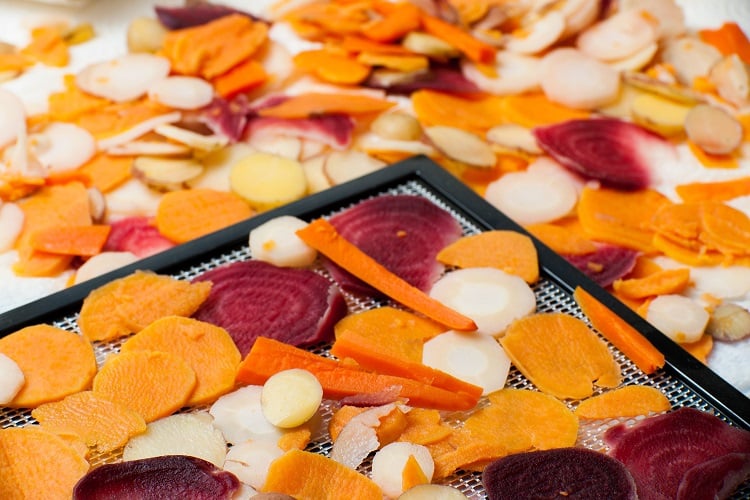
You can dehydrate your own food at home for long-term food storage, and you don’t require fancy or expensive equipment to do this.
You can dry food out in the sun, the old-fashioned way!
However, the food needs three or four days of direct sunlight and you have to ensure that the humidity is less than 20 percent, otherwise, the food will be attacked by mold because of oxidation.
You can also dehydrate food in the oven. You will need to heat the oven to a minimum of 140 degrees Fahrenheit, leave the door ajar, and then place a fan in front of the oven so that it will blow air around the opening. The food should be played on a cookie sheet.
You will have to use the oven for a long time – for example, if you want to dehydrate fruits you will have to use the oven for about 48 hours – so it will use up a lot of energy.
If you want to dehydrate a lot of food, or food on a regular basis, it will be worth purchasing a home dehydrator. This appliance has a heating element, fan, and trays in its design to make the process a lot easier and cut the amount of time it takes to dry food in half.
However, you will still need to be prepared for the long dehydration times – a few hours to a few days.
How To Dehydrate Meat
Meat can be a little tricky to dehydrate for food storage. You have to cook it a bit first to eliminate any bacteria in it.
You should only dehydrate lean meat. This is because oil and fat will cause the meat to rot. Let’s take a look at how to dehydrate different kinds of meat products.
How to dehydrate ground beef and turkey:
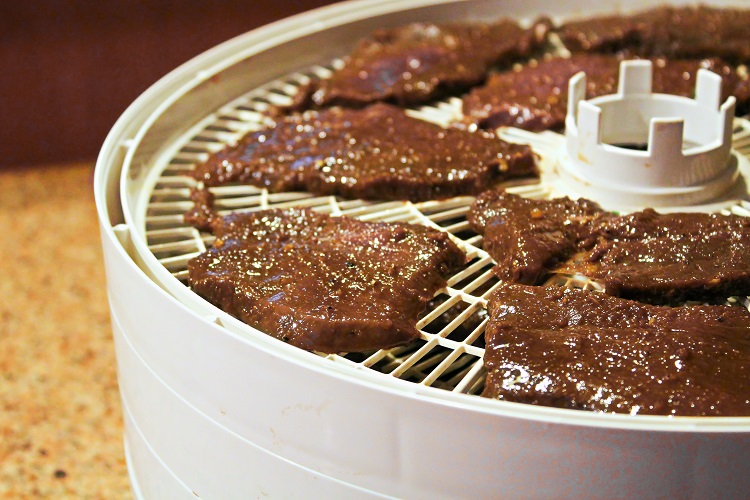
- Chop the meat into small, fine pieces.
- Put the meat in a skillet. You need to cook it until you can’t see any raw or pink meat. This is something you need to do with all types of meat.
- Move the pieces of meat into a colander. This is important to remove any excess fat in the meat. Rinse the meat in boiled water.
- Remove the meat from the colander and season it to taste, and put it aside so that it can cool down.
- Once cool, place the ground meat on trays. You should cover it with parchment paper.
- Dehydrate the meat at 145 degrees Fahrenheit for up to six hours. You will know when the meat is ready by checking that it’s brittle and dry. In an oven, aim for a temperature of around 175 degrees Fahrenheit. Keep the oven door open a few inches to further maintain the temperature.
- If you can see any fat on the meat, use a paper towel to dab at it during the drying process.
- Once dehydrated, transfer the meat to vacuum-sealed containers or glass jars.
- Make sure you store it in a dark, dry room in the home at room temperature. Make sure you leave it there for two months.
How to dehydrate chicken:
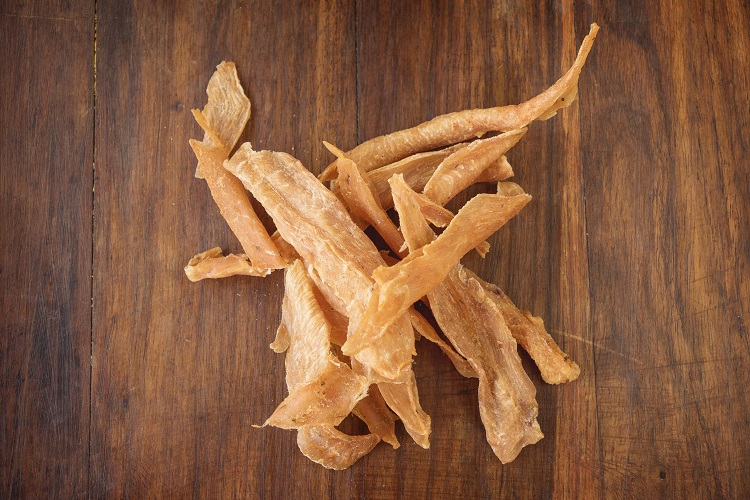
An important tip to bear in mind when dehydrating chicken is to either use canned chicken or chicken that you’ve pressure-cooked.
If you try to dehydrate chicken that’s been fried or baked, it will be very hard to eat. Whether you’ve pressure-cooked your chicken or have purchased canned chicken, you can dehydrate it in the same way.
Here’s how.
- Drain any excess liquid and cut the chicken so that it’s in small pieces.
- Place paper towels on a cutting board and lay out the chicken pieces on top.
- Put paper towels on top of the chicken so that you can press out more moisture.
- Remove any pieces of fat you can see on the chicken.
- Dehydrate at 145 degrees Fahrenheit. In a food dehydrator, this will take around eight hours. You want to check that the chicken is completely dry and crunchy. If you’re dehydrating the chicken in the oven, you should heat the oven to 275 degrees Fahrenheit and cook the chicken until it reaches an internal temp of 160 degrees Fahrenheit.
- When using the oven, make sure you leave the oven door open a few inches and put a fan in front of it to help circulate the dry air.
- Once dehydrated, the chicken should be left to cool down. Then use a vacuum sealer to store it in an air-tight container.
How Long Can Dehydrated Meat Last?
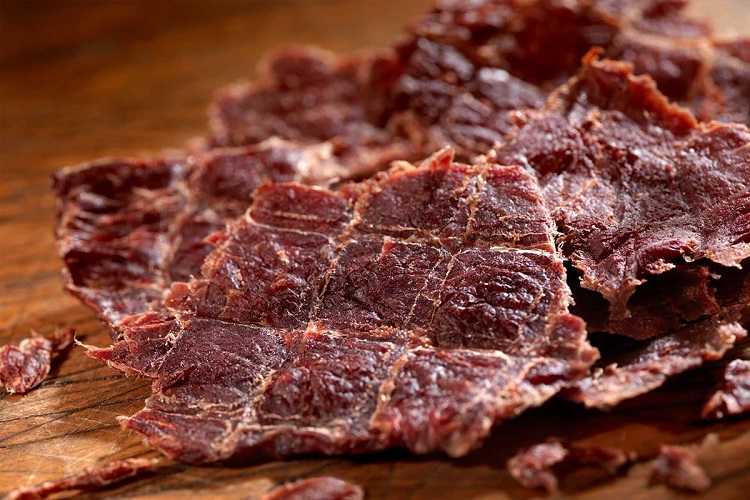
Once dehydrated, any meat that’s been kept in a cold, dry, and dark place should be eaten within a month.
If you’ve stored the meat in a freezer, it can last you for a year. If you’re not freezing the chicken you’ve dehydrated, make sure you eat it within two weeks.
Extra Tips For Dehydrating Meat At Home
- All meat that you want to dehydrate needs to be dried at a temperature of at least 145 degrees Fahrenheit until it’s completely dry and hard.
- You can add breadcrumbs to the meat as this will absorb moisture while also giving your meat some seasoning. For one pound of meat, add half a cup of breadcrumbs.
How Long Does Dehydrated Fruit Last?
If you’re choosing to dehydrate fruit at home, like apricots, you can expect it to last between four and 12 months – as long as you’ve properly stored the food.
While it’s said that dried fruits could last for several years, they’re best consumed within that time frame. Make sure you store the food at around 60 degrees Fahrenheit to make sure it lasts for a year.
You also need to check on the stored food every two weeks to ensure that it’s dry and free of moisture so that bacteria isn’t setting into the food, causing spoilage.
What About Dehydrated Vegetables?
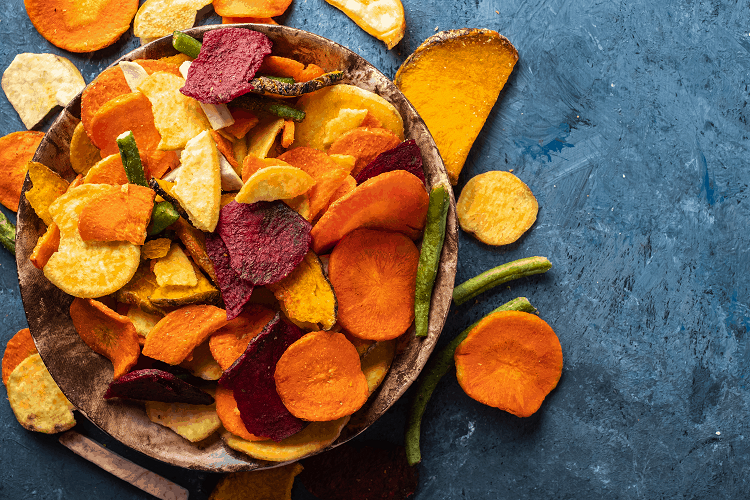
Dehydrated vegetables have around half the shelf life of dehydrated fruits.
Make sure that you dry the veggies well so that they are crispy. Since vegetables tend to become very dry and have less moisture than fruits, they don’t need to be conditioned.
What is Conditioning?
Conditioning is a process that involves evenly distributing any moisture that is left after fruit has been dehydrated so that bacteria and mold is reduced or eliminated.
You can condition fruit by letting it cool after the dehydration process and loosely packing it in mason jars or a glass jar. Seal the container and leave it for 10 days. If there’s excess moisture in the jar, it will be absorbed by the dry pieces of fruit.
Daily, shake the jar so that the pieces of fruit remain separate and keep an eye on any condensation. If you see it, your fruit will require another round of dehydration otherwise the moisture will reduce the shelf life of the fruit.
Can You Dehydrate Whole Meals?
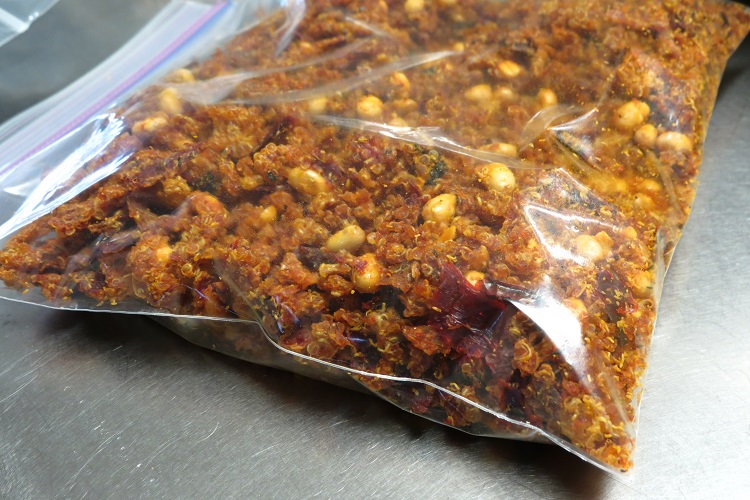
It’s convenient to be able to dehydrate whole meals and leftovers. But is this possible? Yes!
Here’s what you need to know.
- Make sure that you always cook the meal thoroughly before you dehydrate it and store it for later consumption.
- This means that the leftovers have to be reheated properly so that bacteria won’t set into the food.
- You should also cut any veggies and meat in the meal into smaller pieces that will dry faster.
- After dehydrating the food in the dehydrator or oven, let it cool and then divide the meal into single-serve packs.
- Store the bags of food in a cool, dark, and dry place – ideally, store them in the freezer.
- Most meals will dry well at around 135 degrees Fahrenheit, but the process will take between eight and 10 hours. Check the meal for any moisture and break up clumps of food so that they will dry better.
There is a big catch when it comes to dehydrating meals and leftovers. You have to be careful about the ingredients that are in them because not every food item can be dehydrated.
You should follow the rule to never dehydrate food that has fat, dairy, or oils in it. This is because these ingredients will cause the food to spoil quickly and become rancid.
How Long Will Dehydrated Meals Last?
Just like with fruits and veggies, a dehydrated meal (which might contain both of these and meat) can last for between four months and a year if in vacuum-sealed bags or canning jars.
How To Rehydrate Meals
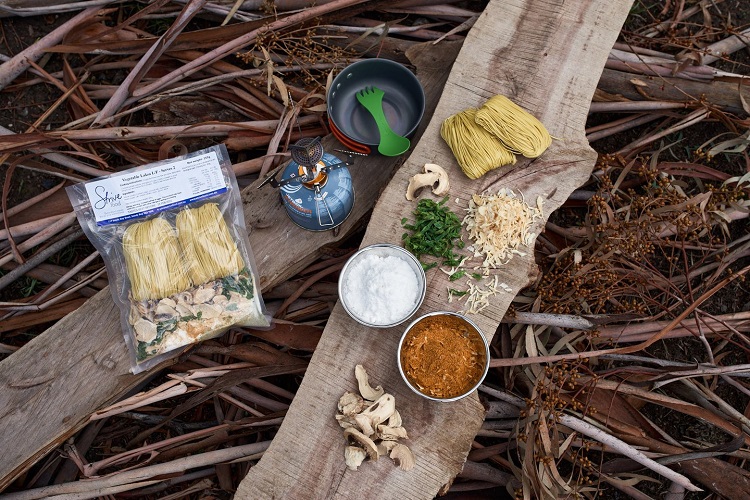
When you’re ready to enjoy your dehydrated meal, you’ll need to rehydrate it so it can be eaten. For this, you’ll need to use equal parts water and dried food.
It’s a good idea to rehydrate the meal with hot water. Bear these pointers in mind.
- Smaller food pieces will rehydrate quickly. Larger pieces of food can take up to a few hours in some cases.
- Uncooked food will take longer to rehydrate than food that was canned, blanched, or roasted.
- Put your meal in a pot and add the water, then let it soak for a few minutes before letting the water come to a boil.
- Turn down the heat and let the meal simmer for between two to 10 minutes.
- Put the heat off and cover the pot. Leave it for about 10 minutes. You want to see that the food becomes tender and soft.
- Enjoy!
Related Questions
Can you dehydrate food in the microwave?
You can use your microwave to dehydrate herbs, but nothing else. This will take two to three minutes. Make sure you place the herbs between paper towel sheets.
Should you blanch vegetables before dehydrating them?
While this is a matter of preference, blanching veggies removes dirt and bacteria in them, while also shortening their cooking time later. It also preserves the color of the vegetables.
Should you store dehydrated food in the freezer?
It depends on how long you want to store it. Choose to store your dehydrated foods in the freezer if you want to use them over a longer period of time.
Conclusion
Every serious prepper needs to consider their food stash and think about dehydrating some food for long term storage.
This food is useful when you’re planning a hiking or camping trip, or planning ahead for an emergency situation because it’s small, compact, easy to carry and gives you the calories you need to survive.
In this article, we’ve looked at various foods you can dehydrate at home, along with important tips like storage time, storage temperature, moisture levels and much more to keep in mind to ensure the food doesn’t spoil and is safe to consume.
Sources:


[lasso rel="emergency-preparedness-more-a-manual-on-food-storage-and-survival-2nd-edition-revised-and-updated" id="35334"]